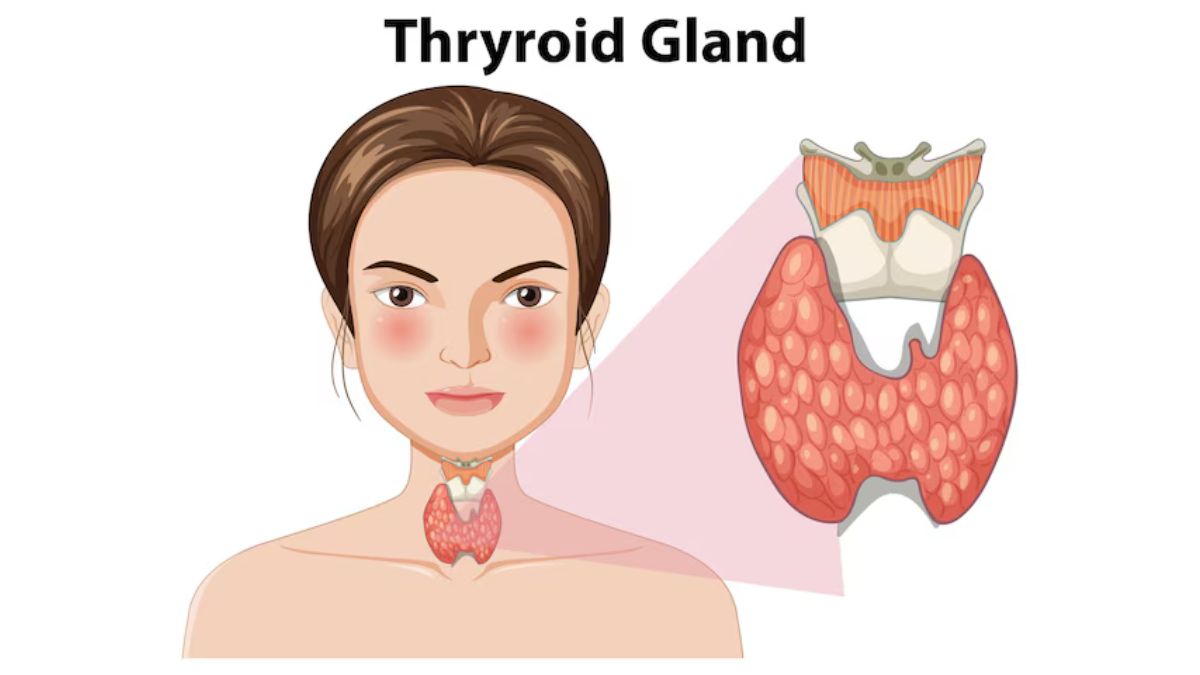Despite a full night’s sleep, you wake up weary. Even if you follow the same diet, your weight swings. You have frequent mood swings, anxiety, and mental fog. If any of this seems familiar, your thyroid may be trying to tell you something.
Thyroid diseases are becoming more frequent, particularly among women. Studies show that women are up to eight times as likely than males to experience thyroid-related problems. But, why is this happening? What makes women more vulnerable? And, most importantly, how do you take control of your thyroid health? Let’s break it down in a way that seems more like a conversation over coffee than a medical lecture.
Understanding The Thyroid Gland
The thyroid is a tiny, butterfly-shaped gland in your neck. Despite its small size, it has a significant impact on your metabolism, energy levels, and general health. It generates two key hormones: thyroxine (T4) and triiodothyronine (T3), which regulate how your body utilises energy.
When the thyroid is working normally, you don’t notice it. However, when it starts misfiring—producing too much or too little hormone—it may cause havoc in your body. The most prevalent thyroid problems are hypothyroidism (underactive thyroid) and hyperthyroidism.
Why are women more susceptible to thyroid disorders?
There are several variables that contribute to the increased frequency of thyroid problems in women:
- Hormonal Fluctuations: Oestrogen and progesterone affect thyroid function. Pregnancy, menopause, and menstruation cause hormonal changes that might affect thyroid function.
- Autoimmune Conditions: Women are more likely to acquire autoimmune disorders including Hashimoto’s thyroiditis and Graves’ disease, which have a direct effect on thyroid function.
- Nutritional Deficiencies: Many women are deficient in critical nutrients such as iodine, selenium, and iron, which are required for thyroid hormone synthesis.
- Chronic Stress: Women frequently juggle several responsibilities—work, family, and social life—resulting in high stress levels, which can instigate or exacerbate thyroid problems.
- Environmental Toxins: Endocrine disrupting substances found in plastics, insecticides, and cosmetic goods can impair thyroid function.
Recognise the symptoms
Thyroid problems appear in a variety of ways, and symptoms are frequently confused for other ailments. Here is how to distinguish between hypothyroidism and hyperthyroidism:
Hypothyroidism (underactive thyroid)
- Unexplained weight increase
- Constant tiredness
- Depression or mood swings
- Dry skin, fragile nails
- Hair thinning or loss
- Cold intolerance
- Slow heart rate
- Brain fog or memory problems
- Constipation
Hyperthyroidism (An overactive thyroid)
- Unexplained weight loss
- Rapid heartbeat or palpitations
- Elevated anxiety or irritation
- Sweating excessively
- Problems sleeping
- Frequent bowel motions or diarrhoea
- Tremors (shaking hands)
- Bulging eyes (in extreme instances)
If you have several symptoms, it may be time to have your thyroid tested.
Diagnosing Thyroid Disorder
A simple blood test that measures TSH (Thyroid-Stimulating Hormone), T3, and T4 levels can determine if your thyroid is working properly. Your doctor may also test for thyroid antibodies to rule out autoimmune conditions such as Hashimoto’s or Graves’ disease.
Managing Thyroid Disorders: Natural and Medical
What is the good news? Thyroid diseases can be successfully handled with the appropriate treatment. Let’s look at your alternatives, whether you favour natural remedies or medicinal interventions.
Diet & Nutrition
What you consume has a big influence on your thyroid function. Here’s what you should focus on:
- Iodine-rich foods: Iodine is required for thyroid hormone synthesis. Add iodised salt, seaweed, dairy, and fish to your diet.
- Selenium: This mineral helps to control thyroid hormone levels. Brazil nuts, sunflower seeds, and eggs are all great sources.
- Iron and zinc: Which may be found in lean meats, seafood, legumes, and nuts, help to promote thyroid function.
- Cruciferous vegetables: Such as broccoli, cauliflower, and cabbage, contain goitrogens (which may interfere with iodine absorption), although they are safe in moderation, especially when cooked.
- Limit Processed Foods: Avoid excessively processed, sugary, and inflammatory foods, which might impair thyroid function.
Lifestyle Changes
Simple lifestyle changes can greatly benefit your thyroid.
- Stress management: Chronic stress increases cortisol levels, which can impair thyroid function. Practice yoga, meditation, or deep breathing techniques.
- Exercise: Moderate activity, such as walking, swimming, and strength training, can assist manage metabolism and energy levels.
- Sleep: Aim for 7-9 hours of excellent sleep to help your body mend and regulate its hormones.
- Avoid endocrine disruptors: Limit your exposure to plastics, nonstick cookware, and chemical-laden cosmetic items.
Medical treatments
There are effective treatment options for thyroid disorders.
- For Hypothyroidism: To replace missing hormones, doctors usually give synthetic thyroid hormones such as levothyroxine.
- For hyperthyroidism: treatment options include anti-thyroid drugs, radioactive iodine therapy, and, in severe instances, surgery.
The Importance of Mental Health in Thyroid Disease
Thyroid diseases have an influence on both physical and mental health. Many women suffer anxiety, melancholy, and brain fog, which can be misconstrued for other mental health issues.
- Support System: Speaking with family, friends, or a therapist can help you negotiate emotional difficulties.
- Mindfulness and meditation: It help reduce stress and increase general well-being.
- Journaling: Recording thoughts and symptoms can aid in tracking improvement and identifying triggers.
Pregnancy and Thyroid Health
Pregnancy puts additional strain on the thyroid, making it critical for expectant moms to check their thyroid levels. Untreated thyroid abnormalities can result in miscarriage, premature delivery, and developmental difficulties in infants.
If you’re contemplating a pregnancy or are already pregnant, frequent thyroid checks are essential.
Myths and misconceptions about thyroid health
Let’s debunk a few prevalent myths:
- “Only overweight people have thyroid problems.” False! Hypothyroidism and hyperthyroidism may affect persons of different sizes.
- “You can cure thyroid disorders with diet alone.” Although nutrition might assist, some people may still require medical care.
- “Taking iodine supplements fixes all thyroid issues.” Not necessarily. Too much iodine might exacerbate thyroid disorders.
- “If my TSH is normal, my thyroid is fine.” Some people have symptoms while having normal TSH levels. It’s also crucial to assess T3, T4, and antibodies.
Thyroid issues are on the rise, but there is good news: you can take control of your health. You may effectively manage thyroid issues by recognising symptoms, obtaining medical advice, changing your food and lifestyle, and prioritising your mental health.
If you suspect a thyroid problem, do not disregard it. Listen to your body, get tested, and take proactive measures to recover. Your thyroid may be little, but it has a huge influence on your life. Give it the care and attention that it deserves!
Also read: The Role of Mentorship: How Networks Empower Women in Business?










